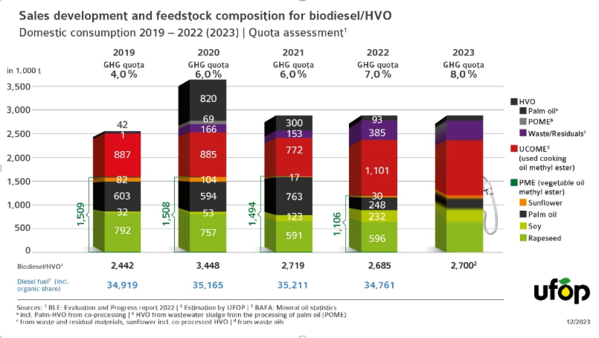BLE publishes evaluation and experience report 2022 - UFOP: GHG efficiency competition reduces biofuel demand
The Union zur Förderung von Oel- und Proteinpflanzen e.V. (UFOP) is taking the evaluation and experience report 2022 recently published by the Federal Office for Agriculture and Food (BLE) as an opportunity to point out the effect of the gradual increase in the GHG reduction obligation enshrined in the GHG Quota Act, which will rise from the current 9.25 percent to 25 percent in 2030. The BLE report once again confirms the efficiency competition of certified greenhouse gas reduction for biofuels.
At around 1.6 million tonnes, the share of biofuels from waste oils and residues that were counted towards the GHG quota obligation was around 60 per cent of domestic consumption. At 0.6 million tonnes, the share of biofuel from rapeseed oil remained unchanged compared to 2021, while the share of biofuels from palm oil fell from 0.76 million tonnes to around 0.25 million tonnes. Total sales for quota crediting remained virtually unchanged at around 2.7 million tonnes, with the quota obligation increasing from 6 to 7 per cent. UFOP attributes this development to the different emission savings of the raw materials used.
The BLE report shows a GHG reduction of around 91 per cent for biofuels from waste and 81 per cent for rapeseed oil. Another reason is the legal regulation that, from 2023, biofuels from palm oil can no longer be counted towards the national GHG quota obligation. The displacement effect of waste oil-based biofuels in turn means that biofuel quantities produced in Germany from rapeseed oil have to be exported.Germany exported around 2.34 million tonnes in 2022 (2021: 2.10 million tonnes) and imported 1.34 million tonnes (2021: 1.04 million tonnes). For the 2023 quota year, UFOP expects sales to remain unchanged at 2.7 million tonnes with an increased GHG reduction commitment of 8 per cent.
With a view to the EU Commission's Union database created in January 2024, UFOP expects similar transparent reporting for all member states. In contrast to the national database "Nabisy", all companies in the supply chain must register here, starting at the level of the collection trade or the collector of waste oils. This process is currently taking place and poses major challenges for the companies affected for the first time, especially as the EU Commission has commissioned the creation of the database and training as a service. It is incomprehensible that the EU Commission is not carrying out these sovereign tasks itself.UFOP is therefore calling for the BLE database Nabisy to be retained at the same time.
The BLE Report 2022 (German) is available at:
The entire press release is available for download


 Union zur Förderung von Oel- und Proteinpflanzen E.V.
Union zur Förderung von Oel- und Proteinpflanzen E.V.
